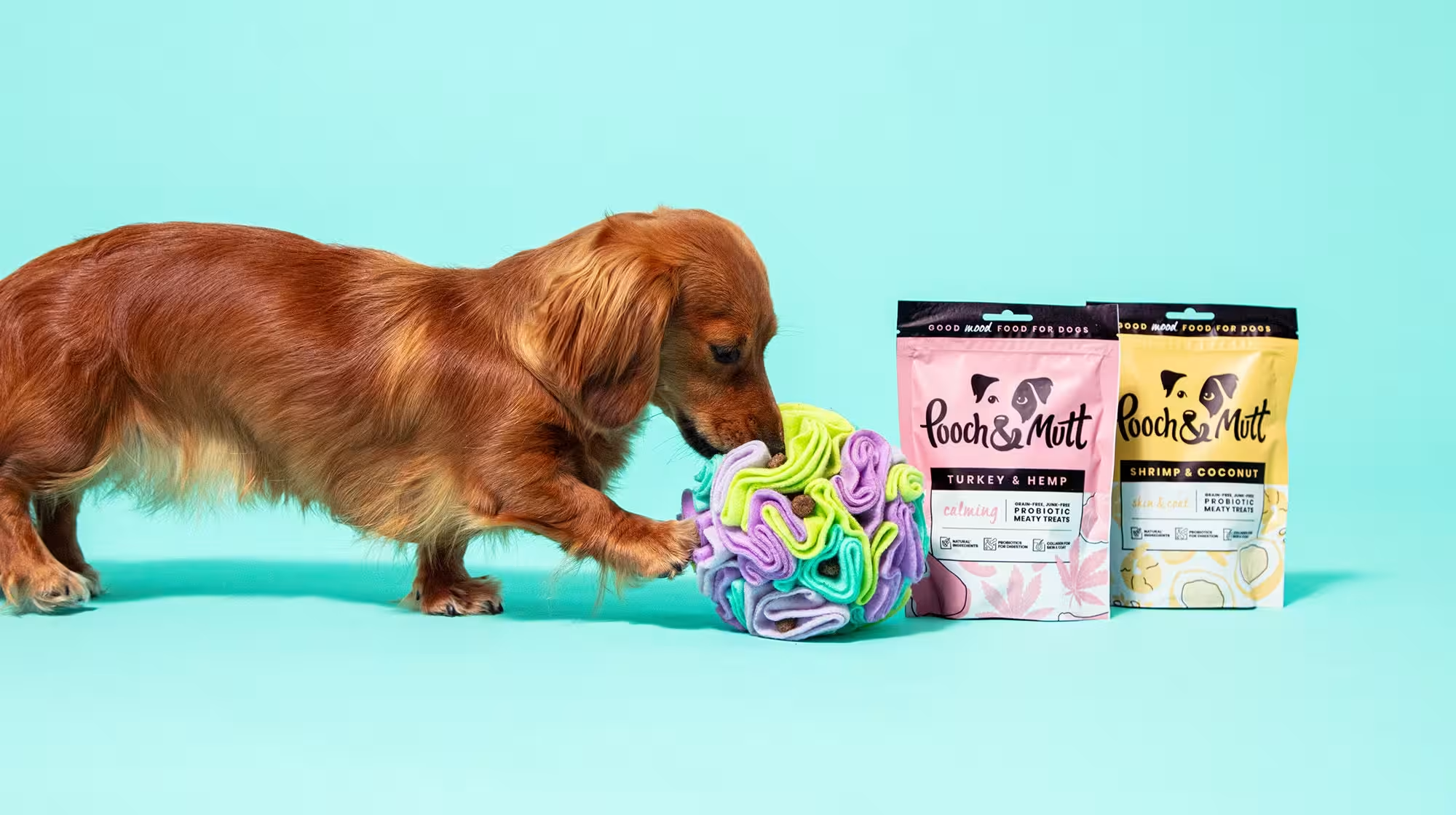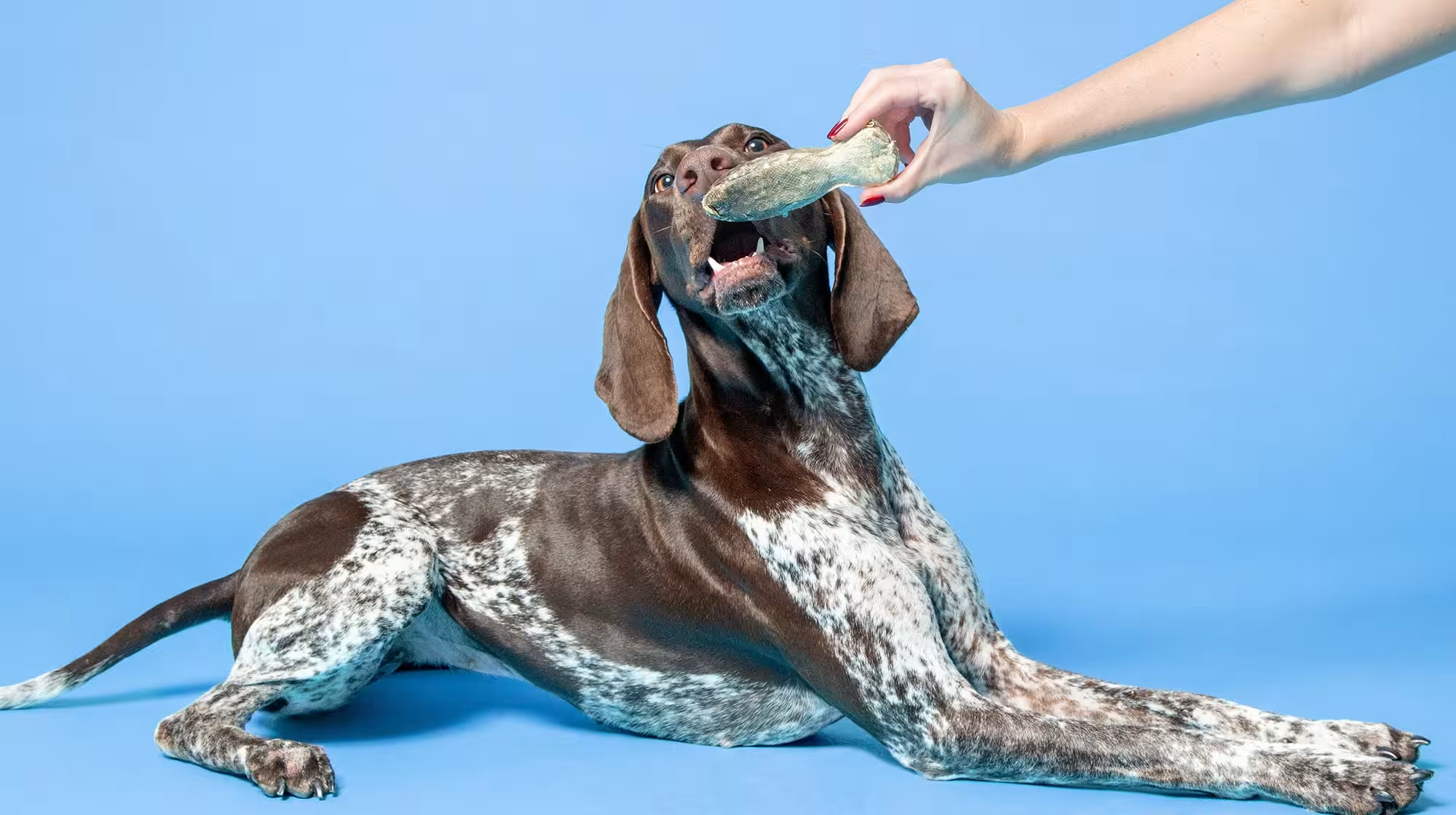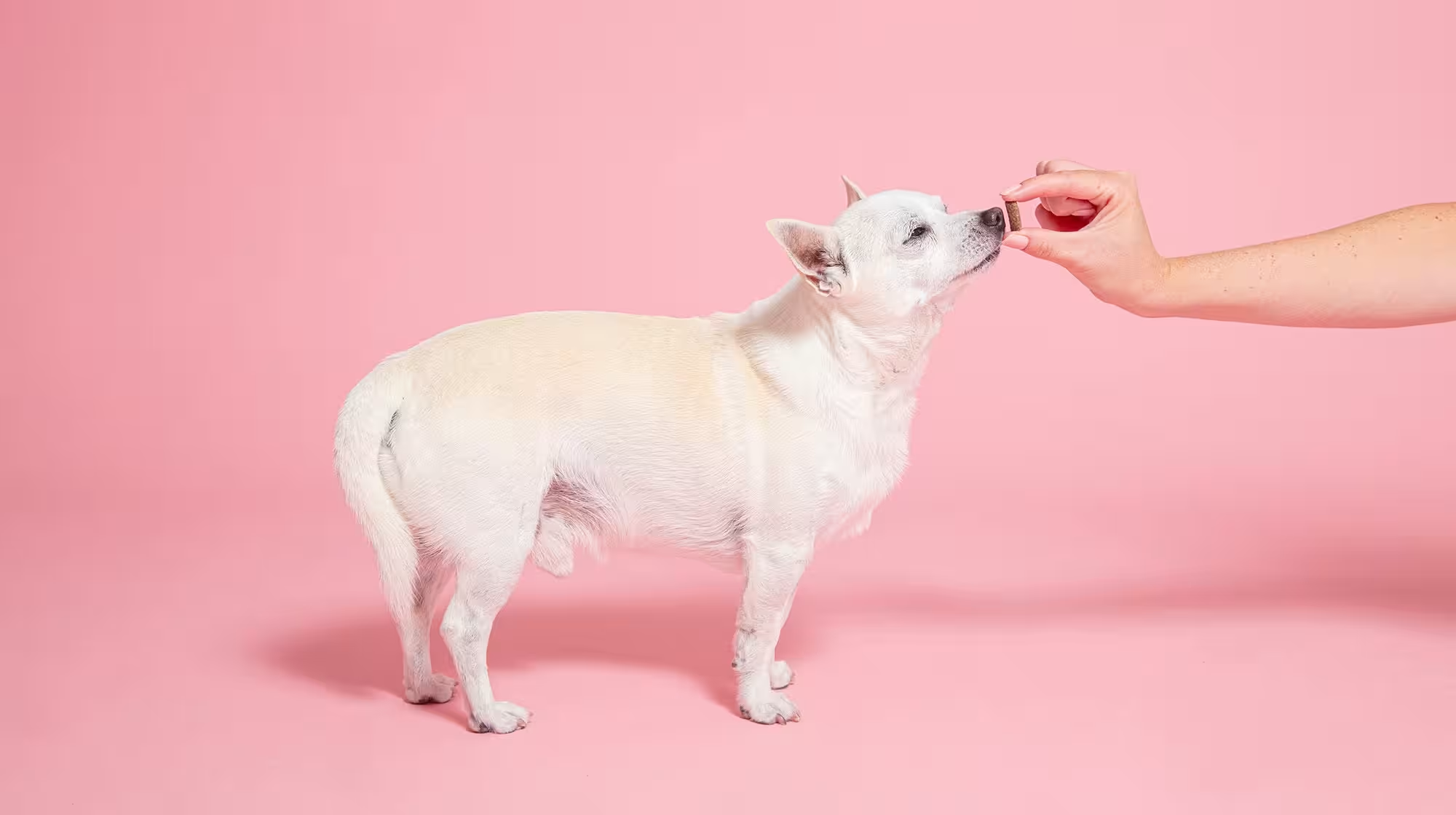When you think of enrichment for dogs, it’s easy to fall into the trap of thinking it’s an area of focus for spritely pups and lively pooches only.
But it’s just as important for our golden oldies. Offering them something mentally and physically stimulating can ignite their zest for life and help keep them more active as they naturally slow down.
In this article, we discuss what enrichment is and some great ways to safely fulfil your senior dog’s life through enrichment activities.
What is enrichment for dogs?
Enrichment means to improve the quality of your pooch's life through mental and physical activities, encouraging them to follow their natural instincts and explore their surroundings.
Sniffing, chewing and licking, exercising, and activities to improve the bond with your pooch are all great ways to enhance your dog's physical and mental wellbeing.
Why is enrichment important for senior dogs?
Whilst your dog might experience some physical challenges with age, such as the loss of mobility, vision, or hearing problems, it doesn’t mean their need for mental stimulation decreases, and they should just surrender to boredom.
In fact, older pups deserve as much attention and playtime as younger dogs, but it’s important to adjust the way we engage with them, as some forms of enrichment activities are better suited for them than others.
Here are some of the reasons why enrichment is so important for senior dogs:
It encourages their problem-solving skills. Challenging your pooch mentally can help them improve their memory and help delay cognitive decline. It can also help improve their attention span, whatever age they may be.
It reduces stress and boredom. A lack of enrichment activities causes boredom, which can lead to behavioural issues at any age. That’s why it’s important to keep your dog busy. Certain sensory activities that include chewing can even reduce stress and help your pooch relax.
It’s fun. Most dogs (whether they’re a puppy or senior pooch) love to be busy and spend time doing something that challenges them! And spending time with their favourite human is an added bonus.
It helps to build confidence. If health issues are taking a toll on your pooch’s confidence, enrichment activities can help boost it back up again. Successfully solving problems contributes to a sense of accomplishment and increased confidence, as the brain releases a mix of feel-good chemicals like serotonin, dopamine, endorphins, and oxytocin.
It maintains mobility. Physical enrichment activities can help to retain your ageing dog’s muscle mass, enabling them to stay active for longer. It’s also important for mental stimulation and helps them to stay in shape.
Enrichment ideas for senior dogs
If you’re looking for senior-friendly enrichment activities, then you’re in the right place. We’ve pulled together some inspiration below to get your golden oldie feeling satisfied, thirsty for life, and to give them a welcome break from those snoozy, lazy days.
Sniffing
Sniffing has a long list of benefits for your dog. It reduces stress and anxiety, helps to improve their overall wellbeing and mental health, and enables them to interact with other pooches.
 Lifestyle
Lifestyle
But why is it so important to older dogs? Sniffing releases dopamine, a neurotransmitter that’s linked to happiness and motivation. It helps to keep your senior dog's brain engaged, especially when they’re slowly starting to experience some cognitive decline.
It’s also essential for your pooch to explore their surroundings, helping them to stay connected with their environment while other senses may be starting to fade. Here are some senior-friendly ways to support your dog’s sniffing sense:
Scavenger hunts: Hide a couple of treats or your dog’s favourite toys around the house, and let them use their hunting instincts to sniff them out. That’ll keep them busy for a couple of hours, whilst you can crack on with your own to-do list.
Scent trails: First, choose a scent (this could be a treat, a high-value reward or even a toy with dog-safe essential oils). Then create a path, and encourage your dog to follow the scent to lead them to a reward at the end. You could even use this opportunity and hide your pooch’s meds in the final treat reward. They’ll be so excited, they won’t even notice it!
Interactive feeder / snuffle ball: An interactive feeder or a snuffle ball is designed to engage your dog's natural instinct. They’re a great tool to prevent boredom and reduce excessive barking and other unwanted behaviours. It’s a fun way to engage their problem-solving skills and keep them occupied.

Chewing and licking
Chewing engages the brain and keeps your dog's mind active. It also helps to tire them out, which can be really helpful when you have a senior dog with mobility issues, who can’t get their daily steps in anymore.
As dogs get older, they experience various physical changes, which can be quite daunting and leave them feeling anxious. That’s where licking activities can come in handy.
They have a soothing effect on your pooch, as licking releases oxytocin - a hormone associated with calmness and bonding with other dogs. Here are some things that you could try with your senior dog:
Licking mats: Set them a little challenge and spread some peanut butter, wet food, blended fruit / vegetables or another treat of your choice on a licking mat and let your senior dog enjoy it. It’s not only reducing stress but also supports your dogs oral hygiene, as licking helps clean their tongue and teeth.
Long-lasting chews: Long-lasting chews like our Fish Hide Chews are a fun and delicious way to keep your pooch occupied for hours. They have lots of health benefits, double up as a toothbrush, and are a safer alternative to rawhide. Read more about it here. It’s worth noting that if your senior pooch has any issues with their teeth and requires softer foods - then this probably isn’t the best option for them.


Long-Lasting Fish Hide Chews
These fish hide chews are a tasty, long-lasting alternative to rawhide for dogs. Made from 100% Fish Skin, they support relaxation while helping to keep teeth healthy.
-
Safer rawhide alternative
-
Hypoallergenic
-
100% Cod Skin
Current price: £4.99
Long-Lasting Fish Hide Chews
Frozen snacks: Frozen snacks are a healthy and tasty treat for your pooch - especially during the summer months. Simply use some banana, xylitol free peanut butter, yoghurt, bone broth, or whatever your pooch’s heart desires into an ice cube tray, pop it in the freezer. It’s worth noting that if your senior pooch has any issues with their teeth and requires softer foods - then this probably isn’t the best option for them.

Exercising
Just like us, dogs benefit from physical exercise at any age. But it’s important that you pick activities that are appropriate for their age and mobility, as dogs are prone to developing arthritis and other joint issues with age.
Regular exercise, alongside a good joint care supplement and dry food can help to strengthen the muscles, support and maintain their aging joints- as well as improving their mental wellbeing.
But a little goes a long way - even low-impact activities can have a big impact on your pooch. It’s important that you take it slow and don’t overdo it, but equally give your dog time to challenge their skills. Here are some activities that are suitable for most ageing pooches:
Swimming/hydrotherapy: Take your dog to your nearest dog-friendly lake, beach or swimming pool - and let them go for a little paddle. Swimming is great for the joints as it improves cardiovascular health and builds muscle strength. You could even try hydrotherapy with your dog, a form of physiotherapy where dogs exercise in a pool of warm water. Don’t forget to check out our blog article on outdoor water safety for dogs.
Short walks: Walks aren’t just a form of physical exercise, but also a great opportunity for your senior pooch to socialise with other dogs and explore their surroundings. Just take it slow and follow the pace of your pooch.
Agility course with household items: Create a little obstacle course with some household items such as boxes, toys or plastic cups. But make sure that the items aren’t too high and set everything up on a stable ground to avoid any slip ups.

Bonding
Take some time out of your day to regularly bond with your senior dog. It’s important that you keep strengthening the relationship with your pooch and provide them with a sense of stability and safety, especially when they’re going through age-related changes and face new challenges as they’re getting older.
As we all know, spending time with loved ones can also help reduce anxiety and stress, but it also builds trust, which is an important part of any relationship. And it’s not only your senior dog that's benefiting from some quality time. There’s one big thing that we can all learn from them: patience!
Teaching them new tricks: Can’t teach an old dog new tricks? That couldn’t be further from the truth. It might take them a little bit longer to learn, but with a lot of positive attitude and patience, it can be really rewarding for your pooch. Just make sure the new tricks are age-appropriate and joint-friendly.
Meeting other senior dogs: Set up a little play date with your dog's friends or go to the park where they can meet new dogs. Ideally, introduce them to other senior dogs, as they are more likely to share the same energy level. Socialising is very important to senior dogs, as it helps to reduce loneliness and can improve their overall wellbeing.
Car rides together. Car rides are a great way to spend quality time with your senior dog and show them new places (only if they like car rides of course). It’s especially helpful when they can’t walk far anymore and struggle to explore new places by foot. Plus, it’s a great way to bond with your four-legged senior.
Senior
Boost your older dogs mental and physical wellbeing with our Senior range
-

 from
fromCurrent price: £8.99
Senior Complete Superfood -

 from
fromCurrent price: £24.99
Multipack Wet Food -

 from
fromCurrent price: £14.99
Joint Tablets For Dogs -

 from
fromCurrent price: £10.99
Mobile Bones For Dogs -

 from
fromCurrent price: £42.49
Senior Complete Bundle -

 from
fromCurrent price: £15.99
Joint Care Dry Food -

 from
fromCurrent price: £11.49
Salmon Oil For Dogs -

 from
fromCurrent price: £18.99
Multivitamin Complex Supplement -

 from
fromCurrent price: £19.99
Sensitivity Dry Dog Food For Allergies -

 from
fromCurrent price: £19.99
Gastrointestinal Dry Dog Food -

 from
fromCurrent price: £8.49
Health & Digestion Dry Food -

 from
fromCurrent price: £15.99
Slim & Slender Dry Food
Here are some of our delicious treats that are perfect for rewarding your pooch for learning new tricks, scent trails and scavenger hunts. We also have a wide range of food and supplements specifically for senior dogs.











